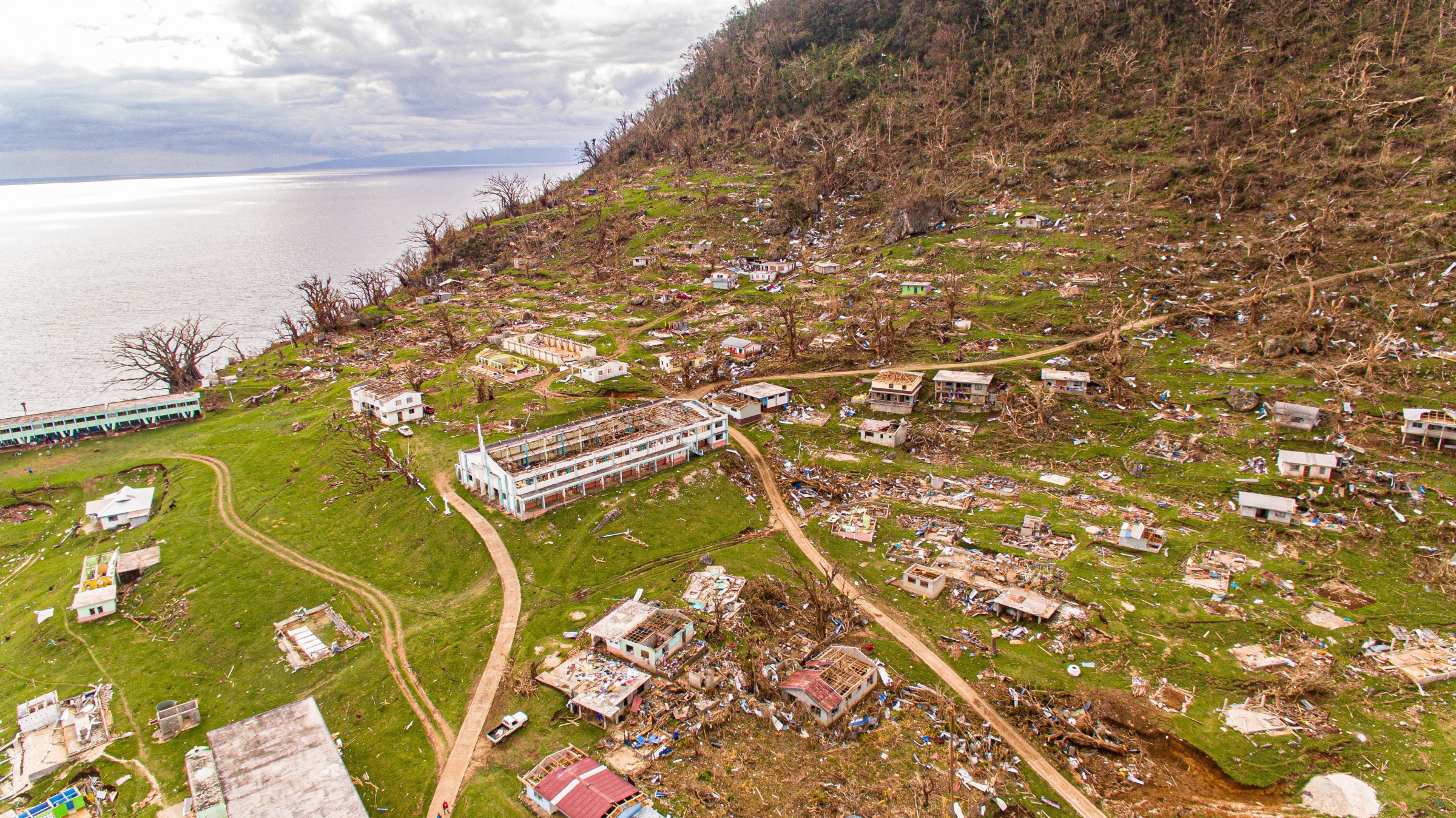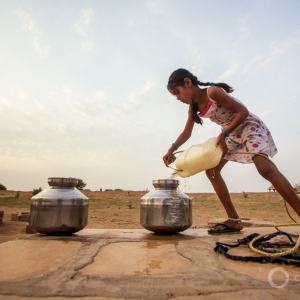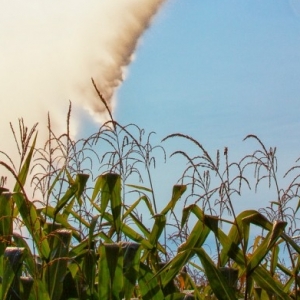The Stream, April 5, 2023: Vanuatu Takes World’s Climate Inaction to International Court

Aerial view of Melsisi village in Vanuatu on April 13, 2020, a week after Tropical Cyclone Harold made landfall on the island nation. Photo © UNICEF/Shing
YOUR GLOBAL RUNDOWN
- An oil spill in a designated area of ecological importance in the United Kingdom has drawn attention and protestors to the vulnerable habitat.
- Vanuatu, vulnerable to the effects of climate change and global warming, brings the question of other governments’ climate inaction to the world’s highest court.
- Unseasonal snow throughout the western Balkans is elevating the risk of floods, electricity shutoffs, and traffic accidents.
- In West Virginia, a federal appeals court rejected a Mountain Valley Pipeline water quality permit, the latest setback for the $6.2 billion natural gas project.
The loss of Uganda’s rapidly melting glaciers will not only affect local communities and wildlife, but also scientists who rely on the ice to study historical climate records.
“When [the glaciers] disappear completely, it’s going to be tough. For the younger generation, they will never see the real beauty of the mountain.” — Enock Bwambale, a Rwenzori Mountains National Park guide.
Some scientists predict that Uganda’s last remaining glaciers, which are melting faster than the global average, will completely vanish within the next decade. These changes are especially significant in Rwenzori Mountains National Park, a UNESCO World Heritage Site and home to the Stanley Glacier atop Mount Stanley, the third-highest point in Africa, Yale Environment 360 reports.
“Endemic, endangered, and rare species” have uniquely adapted to the glacial hillside’s unique climate and terrain, but they are losing habitat as warming temperatures melt the landscape. At lower elevations and near riverbanks, dozens of people have been killed, and thousands more displaced as extreme rainfall and flash floods have become more prevalent.
Crucially, Uganda’s glaciers are disappearing faster than scientists can glean information from them about the country and continent’s climate past and future. “The loss of information derived from ice cores (which contain pockets of ancient air) makes it hard for climate scientists to make accurate models for tropical Africa or to provide that information for global models,” Yale Environment 360 reports.
— Christian Thorsberg, Interim Stream Editor
Recent WaterNews from Circle of Blue
- UN Water Conference Marked by Enthusiasm, Uncertainty — Conference produces more than 700 commitments for water.
- Great Lakes Take Global Stage — UN Water Conference highlights risks and opportunities for the Great Lakes region.
The Lead
Vanuatu, the Pacific island nation of about 320,000 people, is pursuing climate justice in the world’s highest international courts, the New York Times reports.
At the United Nations’ General Assembly last week, Vanuatu’s leaders proposed a measure to take to the International Court of Justice (ICJ), the world’s highest court, in The Hague. The question is whether countries can be sued for failing to reduce carbon emissions.
No other country placed a vote, meaning the measure passed by consensus and the international court will be required to issue an opinion on the matter. If the ICJ answers “yes” to Vanuatu’s question, they would lay the groundwork for the world’s governments being legally bound to take climate action, or else be met with legal consequences, according to the New York Times.
These events came weeks after two tropical storms, Juddy and Kevin, hit Vanuatu and affected about 80 percent of the island. Homes were destroyed in the early March storms, electricity was lost, and infrastructure supporting drinking water was disrupted: “The pumping of water to homes was not reliable and drinkable water and water for household use is not universally available for everyone,” Jack French, Save the Children’s acting country director in Vanuatu, told Al Jazeera.
The nation’s lifeways of subsistence farming also took a hit — with no reliable water sources, crops that weren’t destroyed in the storms are dying. As a partial result, waterborne illnesses such as acute gastroenteritis and diarrhea are surging, especially among children. Some pediatric wards in the country are already requiring extra space as wards quickly fill, according to Al Jazeera.
Vanuatu, one of the most vulnerable nations in the world to climate change, has been seeking international justice for years while also “leading by example,” pledging complete conversion to renewable energy by 2030, despite already being net carbon-negative.
This Week’s Top Water Stories, Told In Numbers
200
Number of barrels of reservoir fluid — a solution that is about 15 percent oil — that spilled into Poole Harbor and has since washed up to the shores of Brownsea Island, both in southern U.K. The area, internationally recognized for its ecological importance, the Guardian reports, is a known haven for wildlife including oysters and sandwich terns, and supports freshwater wetlands, lagoons, and reedbeds. Already, 30 birds have been identified as contaminated, and oil film has traveled the waters to the shores of Brownsea Island, one of the only places in the country where indigenous red squirrels today survive. Protestors are calling for Perenco, the company responsible for the oil leak, to cease their operations at the location — adjacent to an enclosed bay and “low-energy environment,” the Guardian reports. Breaking down and dispersing any oil at such a separated location will be more difficult compared to a spill at an open sea.
94
Percent of the 303-mile Mountain Valley Pipeline (MVP), which would transport natural gas through West Virginia, that has already been built, Reuters reports. The majority of the unfinished construction currently sits near stream and river crossings, and requires an approved water quality permit to complete. But this permit was unanimously denied this week by a federal court, further stalling the $6.2 billion project. According to the Charleston Gazette-Mail, the “checkered past” of the developing company, Equitrans Midstream Corporation, played a role in the decision. The company has racked up 46 water quality violations and 139 oil and gas construction general permit violations with the MVP so far.
On the Radar
As seasons continue to shift across the world, the western Balkans — including Serbia, Croatia, Montenegro, Kosovo, and Bosnia — are experiencing unprecedented levels of snowfall and moisture this spring, Reuters reports. Over the past century, snow cover has been recorded only 10 other times in Serbia, and none as significant nor persistent as this. The weather has shut down mountain roads, cut off electricity to villages, halted ferry lines, and brought down many trees and branches. Riverside roads and towns are bracing for floods as the weather is expected to continue, according to Reuters.
More Water News
New Rainbow Trout: A new subspecies of rainbow trout has been identified in California’s McCloud River, Phys.org reports. It has been named O. mykiss calisulat, which means “beautiful trout” in the language of the Winnemem Wintu, the tribe whose homelands the trout primarily lives within.
Fog Water: Rural communities in Chile, near the expanding Atacama Desert, are successfully harvesting thousands of gallons of water from fog nets annually, Mongbay reports.
Christian Thorsberg is an environmental writer from Chicago. He is passionate about climate and cultural phenomena that often appear slow or invisible, and he examines these themes in his journalism, poetry, and fiction.






Leave a Reply
Want to join the discussion?Feel free to contribute!